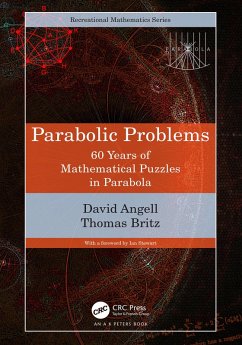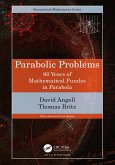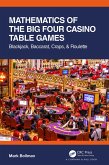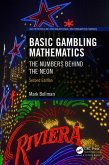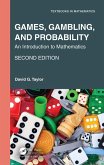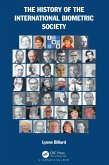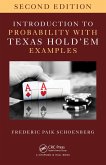David Angell, Thomas Britz
Parabolic Problems (eBook, ePUB)
60 Years of Mathematical Puzzles in Parabola
30,95 €
30,95 €
inkl. MwSt.
Sofort per Download lieferbar

15 °P sammeln
30,95 €
Als Download kaufen

30,95 €
inkl. MwSt.
Sofort per Download lieferbar

15 °P sammeln
Jetzt verschenken
Alle Infos zum eBook verschenken
30,95 €
inkl. MwSt.
Sofort per Download lieferbar
Alle Infos zum eBook verschenken

15 °P sammeln
David Angell, Thomas Britz
Parabolic Problems (eBook, ePUB)
60 Years of Mathematical Puzzles in Parabola
- Format: ePub
- Merkliste
- Auf die Merkliste
- Bewerten Bewerten
- Teilen
- Produkt teilen
- Produkterinnerung
- Produkterinnerung

Bitte loggen Sie sich zunächst in Ihr Kundenkonto ein oder registrieren Sie sich bei
bücher.de, um das eBook-Abo tolino select nutzen zu können.
Hier können Sie sich einloggen
Hier können Sie sich einloggen
Sie sind bereits eingeloggt. Klicken Sie auf 2. tolino select Abo, um fortzufahren.

Bitte loggen Sie sich zunächst in Ihr Kundenkonto ein oder registrieren Sie sich bei bücher.de, um das eBook-Abo tolino select nutzen zu können.
This book collects the very best of the almost 1800 problems and puzzles published in Parabola magazine into a single volume. Many of the problems have been re-mastered, and new illustrations have been added. Topics covered range across geometry, number theory, combinatorics, logic, and algebra.
- Geräte: eReader
- mit Kopierschutz
- eBook Hilfe
Andere Kunden interessierten sich auch für
![Parabolic Problems (eBook, PDF) Parabolic Problems (eBook, PDF)]() David AngellParabolic Problems (eBook, PDF)30,95 €
David AngellParabolic Problems (eBook, PDF)30,95 €![Mathematics of The Big Four Casino Table Games (eBook, ePUB) Mathematics of The Big Four Casino Table Games (eBook, ePUB)]() Mark BollmanMathematics of The Big Four Casino Table Games (eBook, ePUB)33,95 €
Mark BollmanMathematics of The Big Four Casino Table Games (eBook, ePUB)33,95 €![Basic Gambling Mathematics (eBook, ePUB) Basic Gambling Mathematics (eBook, ePUB)]() Mark BollmanBasic Gambling Mathematics (eBook, ePUB)54,95 €
Mark BollmanBasic Gambling Mathematics (eBook, ePUB)54,95 €![Quantifying Counterfactual Military History (eBook, ePUB) Quantifying Counterfactual Military History (eBook, ePUB)]() Brennen FaganQuantifying Counterfactual Military History (eBook, ePUB)26,95 €
Brennen FaganQuantifying Counterfactual Military History (eBook, ePUB)26,95 €![Games, Gambling, and Probability (eBook, ePUB) Games, Gambling, and Probability (eBook, ePUB)]() David G. TaylorGames, Gambling, and Probability (eBook, ePUB)59,95 €
David G. TaylorGames, Gambling, and Probability (eBook, ePUB)59,95 €![The History of the International Biometric Society (eBook, ePUB) The History of the International Biometric Society (eBook, ePUB)]() Lynne BillardThe History of the International Biometric Society (eBook, ePUB)49,95 €
Lynne BillardThe History of the International Biometric Society (eBook, ePUB)49,95 €![Introduction to Probability with Texas Hold 'em Examples (eBook, ePUB) Introduction to Probability with Texas Hold 'em Examples (eBook, ePUB)]() Frederic Paik SchoenbergIntroduction to Probability with Texas Hold 'em Examples (eBook, ePUB)65,95 €
Frederic Paik SchoenbergIntroduction to Probability with Texas Hold 'em Examples (eBook, ePUB)65,95 €-
-
-
This book collects the very best of the almost 1800 problems and puzzles published in Parabola magazine into a single volume. Many of the problems have been re-mastered, and new illustrations have been added. Topics covered range across geometry, number theory, combinatorics, logic, and algebra.
Dieser Download kann aus rechtlichen Gründen nur mit Rechnungsadresse in A, B, BG, CY, CZ, D, DK, EW, E, FIN, F, GR, HR, H, IRL, I, LT, L, LR, M, NL, PL, P, R, S, SLO, SK ausgeliefert werden.
Produktdetails
- Produktdetails
- Verlag: Taylor & Francis eBooks
- Seitenzahl: 300
- Erscheinungstermin: 27. Juni 2024
- Englisch
- ISBN-13: 9781040041703
- Artikelnr.: 70510751
- Verlag: Taylor & Francis eBooks
- Seitenzahl: 300
- Erscheinungstermin: 27. Juni 2024
- Englisch
- ISBN-13: 9781040041703
- Artikelnr.: 70510751
- Herstellerkennzeichnung Die Herstellerinformationen sind derzeit nicht verfügbar.
David Angell studied mathematics at Monash University and the University of New South Wales, Australia, earning a Ph.D. from the latter institution with a thesis on Mahler's method in transcendence theory. He has been a member of the academic staff in the School of Mathematics at UNSW since 1989, and has consistently received glowing evaluations of his teaching both from colleagues and from students. David has taught a wide variety of mathematics subjects, but his favourites have always been number theory and discrete mathematics. He is particularly interested in teaching students to produce proofs and other mathematical writing which are clearly expressed, logically impeccable and engaging for the reader. David is strongly committed to extension activities for secondary school students. He has for many years been the problems editor for Parabola, the online mathematics magazine produced by UNSW, as well as contributing a number of articles to the magazine. He has also given talks on a wide variety of topics to final-year secondary students. His text Irrationality and Transcendence in Number Theory was published by CRC Press, Taylor & Francis in 2022.
Beyond mathematics, David is an enthusiast for wilderness activities and has undertaken expeditions in Australia, Greenland, Nepal, Morocco and many other areas. He is a keen amateur musician, and is the founding conductor of the Bourbaki Ensemble, a chamber string orchestra based in Sydney, Australia.
Thomas Britz studied mathematics and physics at Aarhus University, M.I.T. and Queen Mary University of London. After receiving a Ph.D. in mathematics from Aarhus University, Thomas completed postdoctoral fellowships at Victoria University, BC, the Technical University of Denmark and the University of New South Wales. Thomas has been a member of the School of Mathematics and Statistics at UNSW Sydney since 2010 and is currently the president of the Combinatorial Mathematics Society of Australasia (CMSA).
In addition to his research on combinatorics and its applications, Thomas spends great effort to support and care for students and their education, and he strongly promotes the use of caring and emotions in education among fellow teachers. As chief editor of Parabola since 2014, Thomas has invited readers and contributors from all around the world to enjoy and create its mathematical content, so that it is now the largest international maths journal for students and anyone else interested in maths. Thomas is also a father, and he enjoys a busy life with his awesome partner and lovely children. He loves to solve puzzles and think about things, often more than is good for him.
Beyond mathematics, David is an enthusiast for wilderness activities and has undertaken expeditions in Australia, Greenland, Nepal, Morocco and many other areas. He is a keen amateur musician, and is the founding conductor of the Bourbaki Ensemble, a chamber string orchestra based in Sydney, Australia.
Thomas Britz studied mathematics and physics at Aarhus University, M.I.T. and Queen Mary University of London. After receiving a Ph.D. in mathematics from Aarhus University, Thomas completed postdoctoral fellowships at Victoria University, BC, the Technical University of Denmark and the University of New South Wales. Thomas has been a member of the School of Mathematics and Statistics at UNSW Sydney since 2010 and is currently the president of the Combinatorial Mathematics Society of Australasia (CMSA).
In addition to his research on combinatorics and its applications, Thomas spends great effort to support and care for students and their education, and he strongly promotes the use of caring and emotions in education among fellow teachers. As chief editor of Parabola since 2014, Thomas has invited readers and contributors from all around the world to enjoy and create its mathematical content, so that it is now the largest international maths journal for students and anyone else interested in maths. Thomas is also a father, and he enjoys a busy life with his awesome partner and lovely children. He loves to solve puzzles and think about things, often more than is good for him.
1. Problems. 2. Solutions. 3. Some Useful Problem-solving Techniques. 3.1.
Greatest Common Divisor. 3.2. Solving Linear Diophantine Equations. 3.3.
Modular Arithmetic. 3.4. Graph Theory. 3.5. Basic Combinatorics. 3.6. The
Binomial Theorem. 3.7. Some Trigonometric Formulae. 3.8. Proof by
Mathematical Induction. 3.9. Pick's Theorem. 3.10. Roots and Coefficients
of Polynomials. 3.11. Inequalities.
Greatest Common Divisor. 3.2. Solving Linear Diophantine Equations. 3.3.
Modular Arithmetic. 3.4. Graph Theory. 3.5. Basic Combinatorics. 3.6. The
Binomial Theorem. 3.7. Some Trigonometric Formulae. 3.8. Proof by
Mathematical Induction. 3.9. Pick's Theorem. 3.10. Roots and Coefficients
of Polynomials. 3.11. Inequalities.
1. Problems. 2. Solutions. 3. Some Useful Problem-solving Techniques. 3.1.
Greatest Common Divisor. 3.2. Solving Linear Diophantine Equations. 3.3.
Modular Arithmetic. 3.4. Graph Theory. 3.5. Basic Combinatorics. 3.6. The
Binomial Theorem. 3.7. Some Trigonometric Formulae. 3.8. Proof by
Mathematical Induction. 3.9. Pick's Theorem. 3.10. Roots and Coefficients
of Polynomials. 3.11. Inequalities.
Greatest Common Divisor. 3.2. Solving Linear Diophantine Equations. 3.3.
Modular Arithmetic. 3.4. Graph Theory. 3.5. Basic Combinatorics. 3.6. The
Binomial Theorem. 3.7. Some Trigonometric Formulae. 3.8. Proof by
Mathematical Induction. 3.9. Pick's Theorem. 3.10. Roots and Coefficients
of Polynomials. 3.11. Inequalities.
